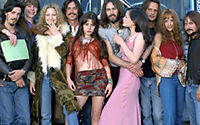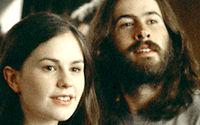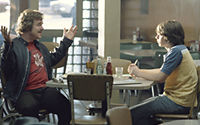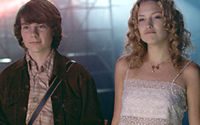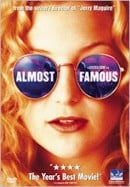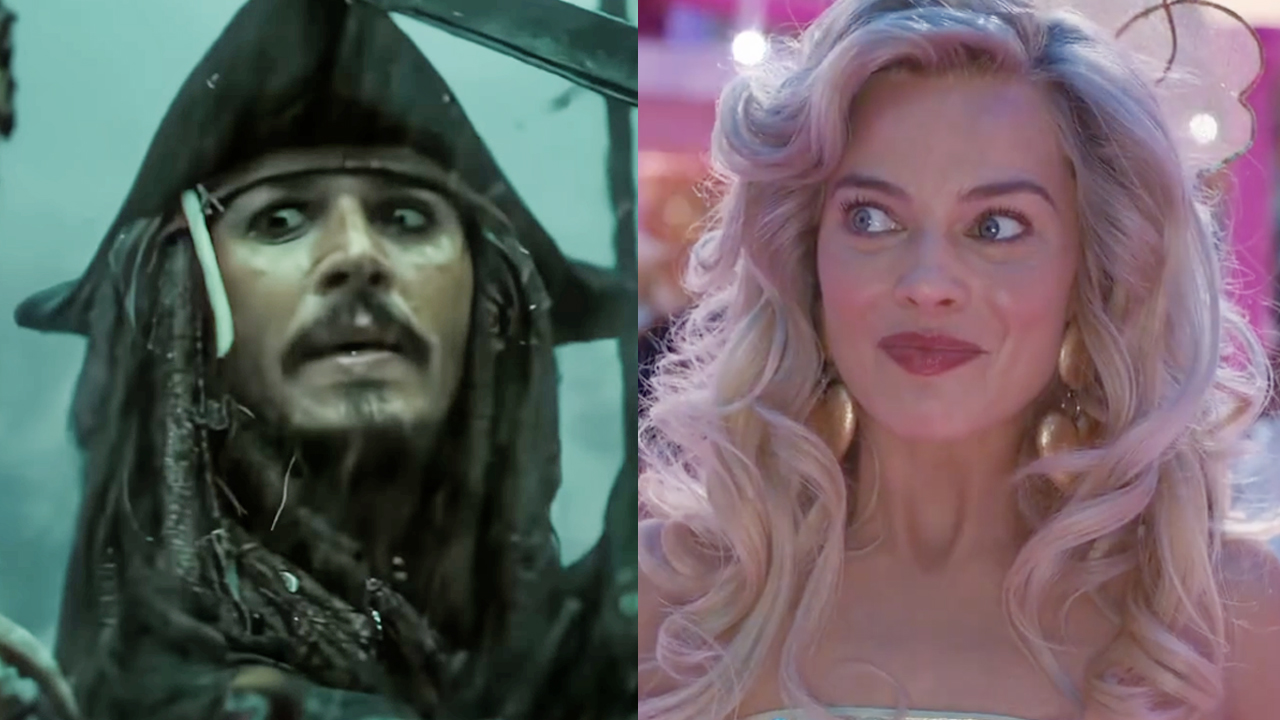Now I know the true power of film...and am humbled by its true might. I'm also slightly melancholy. Sure, movies can inspire, movies can terrify, movies can even make you go home a better person. That's what we want movies to do. Each film sets out with a purpose. Its worth to an audience is determined by its success in attaining that goal.
But what if one movie doesn't do what you expected it to do... What if it does something so completely off-the-scale that you don't know what to do but have a minor epiphany?
In the words of Inigo Montoya: "Let me 'splain. No, there is too much. Let me sum up."
Unfortunately, the plot of Almost Famous looks horribly average on paper...it's really not, but it looks that way. William Miller (newcomer Patrick Fugit) gets the chance, at the age of 15, to tour with and write an article in "Rolling Stone" about an up-and-coming early 70s rock band, the fictional Stillwater. Along the way, he experiences life close to fame, the wackiness associated with any rock band of that era, and eventually (you may groan) he grows up. Yes, yes...it's sounds stupid, and contrived, and every other negative thing you could say about a plot. It's also none of those things.
Nobody in this Magical Mystery Tour is a one-note character (with the exception of Jason Lee's occasionally amusing lead singer Jeff Bebe). Fugit's William is fresh, and honest, but he's also a little rebellious. He wants things to succeed for everyone, but at the same time he wants to help himself and become a professonal writer. This, of course, leads to an internal conflict: does he tell the truth and hurt the band, or does he sugar-coat it and hurt himself?
Stillwater's lead guitarist Russell Hammond, played by Billy Crudup, has a similar conflict. He genuinely likes and cares about William, but he also tries to steer the article away from the nasty details that could spell a success for the aspiring young rock critic.
Another great performance comes from Frances McDormand as William's hyper-protective yet free-thinking mother. There's a hilarious exchange between her and Russell that would have had me rolling over in laughter had I not been watching in the wee hours of the night.
Your Daily Blend of Entertainment News
Beyond all that, though, is the main reason this movie trashed all the boundaries my mind had preset for what cinema can and can't do: the enigmatic Penny Lane (Kate Hudson). Penny Lane is the central force that keeps this film from becoming standard and connect-the-dots. She's the random factor that makes the film one of the greatest ever made. Why? Because I fell for her.
Yes...okay...you can stop snickering now. I mean it. When I see a movie with a well-written sympathetic female, the most I'm supposed to feel is "Gee, I'd like to know her." That's the convention. That's the limit. But not anymore. You know why? Because all the women you're usually supposed to feel for are...well, conventional to some extent. Penny Lane is exotic. Penny Lane is mysterious. Penny Lane is sweet, kind, generous. Penny Lane is also vulnerable, though she won't show it. Penny Lane is the first fictional character in the history of literature or cinema to touch my heart at it core, to make me feel not only the joy but the heartache. I've never even met the woman, can never meet the woman. And yet, Penny Lane is in my ears and in my eyes.
I know; I sound sad, I sound pathetic, I sound so desperate that I'll leap for the first interesting female I see, no matter her status in reality. You can only understand by seeing this film. You may not fall for her...but you'll get it. What makes Penny, well, Penny is not only Kate Hudson's brilliant performance, but Cameron Crowe's script and his direction, the balancing force that Patrick Fugit provides in his relationship with her, and, as with everything in this movie, the music.
While some movies throw in a couple of good songs that sound appropriate at a certain point in the film, Crowe (with an assist from Peter Frampton), carefully...o so carefully, constructs his soundtrack so that you can not be sure what came first...the order of the songs, or the direction of the script. Each element seems to write the other.
What makes this all real, though, is the fact that it has a basis in truth. Cameron Crowe, much like William Miller, really did write for "Rolling Stone" from a young age. He did have amazing and weird adventures. He was deflowered in interesting ways. I suspect he met somebody like Penny Lane, because he wrote her to be so real that stupid dorks like me immediately scour the Internet for wallpaper of the woman to post on their computer desktops.
My dad always told me (sort of) that I should always make sure that I'm always at a point where I can die tomorrow and be happy about the way things turned out. Crowe, I believe, is at a similar point. He could never make another decent film again, heck, he could never touch a camera again, and he would still be one of the greatest directors I can think of, if only for one singular film (with an assist from the less mind-blowing Jerry Maguire).
Right now, I have two things to say to Mr. Crowe:
1) Thanks for Penny.
2) Listen, you. Do you know how hard it is to love someone who doesn't even exist? Did you even consider that for a second before you wielded this immense pen of yours to shatter my fragile teenage psyche? HUH?
Ahem...anyway. There is simply no way for me to objectively review this movie. I'm too attached to it now...I cannot let it (or HER) go. It has become part of me, in a way that no other film has. I now know that there is so much that cinema is capable of. It can be more real than your own bedroom.
